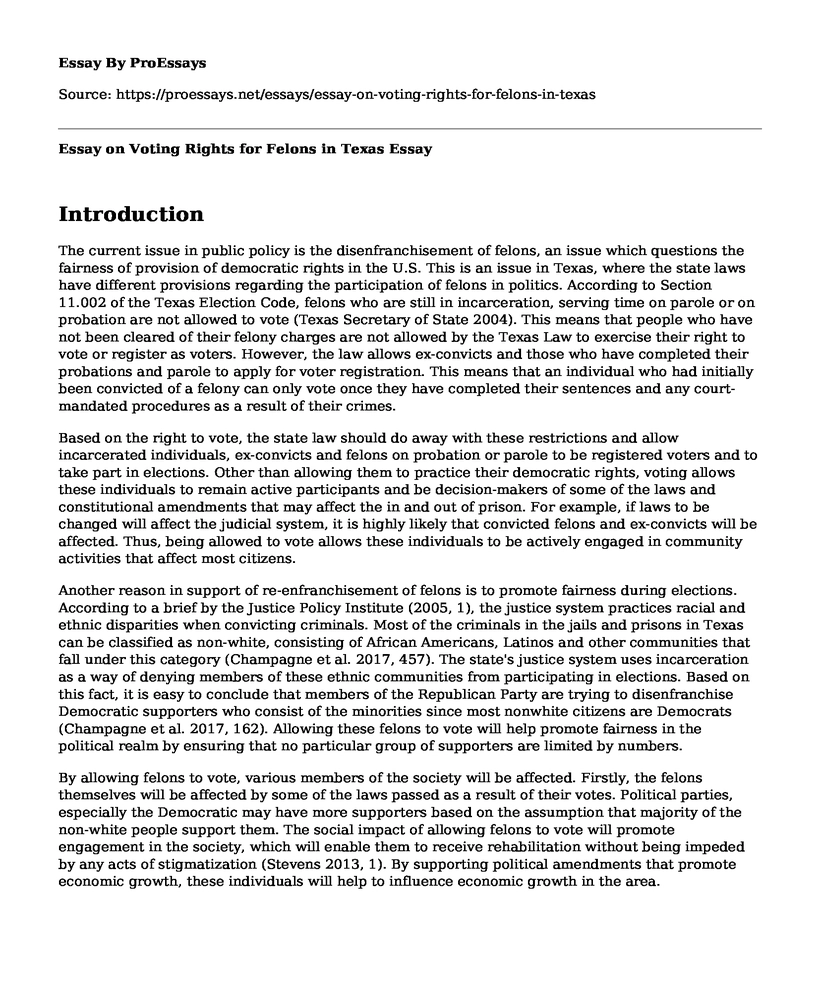Introduction
The current issue in public policy is the disenfranchisement of felons, an issue which questions the fairness of provision of democratic rights in the U.S. This is an issue in Texas, where the state laws have different provisions regarding the participation of felons in politics. According to Section 11.002 of the Texas Election Code, felons who are still in incarceration, serving time on parole or on probation are not allowed to vote (Texas Secretary of State 2004). This means that people who have not been cleared of their felony charges are not allowed by the Texas Law to exercise their right to vote or register as voters. However, the law allows ex-convicts and those who have completed their probations and parole to apply for voter registration. This means that an individual who had initially been convicted of a felony can only vote once they have completed their sentences and any court-mandated procedures as a result of their crimes.
Based on the right to vote, the state law should do away with these restrictions and allow incarcerated individuals, ex-convicts and felons on probation or parole to be registered voters and to take part in elections. Other than allowing them to practice their democratic rights, voting allows these individuals to remain active participants and be decision-makers of some of the laws and constitutional amendments that may affect the in and out of prison. For example, if laws to be changed will affect the judicial system, it is highly likely that convicted felons and ex-convicts will be affected. Thus, being allowed to vote allows these individuals to be actively engaged in community activities that affect most citizens.
Another reason in support of re-enfranchisement of felons is to promote fairness during elections. According to a brief by the Justice Policy Institute (2005, 1), the justice system practices racial and ethnic disparities when convicting criminals. Most of the criminals in the jails and prisons in Texas can be classified as non-white, consisting of African Americans, Latinos and other communities that fall under this category (Champagne et al. 2017, 457). The state's justice system uses incarceration as a way of denying members of these ethnic communities from participating in elections. Based on this fact, it is easy to conclude that members of the Republican Party are trying to disenfranchise Democratic supporters who consist of the minorities since most nonwhite citizens are Democrats (Champagne et al. 2017, 162). Allowing these felons to vote will help promote fairness in the political realm by ensuring that no particular group of supporters are limited by numbers.
By allowing felons to vote, various members of the society will be affected. Firstly, the felons themselves will be affected by some of the laws passed as a result of their votes. Political parties, especially the Democratic may have more supporters based on the assumption that majority of the non-white people support them. The social impact of allowing felons to vote will promote engagement in the society, which will enable them to receive rehabilitation without being impeded by any acts of stigmatization (Stevens 2013, 1). By supporting political amendments that promote economic growth, these individuals will help to influence economic growth in the area.
Conclusion
In pursuit of the amendment of voting rights of incarcerated felons and ex-convicts, the formation of an interest group will be useful in addressing the matter. By focusing on the effect that will arise through their inclusion, it is possible that the political party that will be favored by the numbers in jail will provide financial and political support in pushing for the amendment of this law. Public education will be useful in mobilizing people to support the interest group and influence policy makers (Champagne et al. 2017, 185). Another action will be to write a petition to the government to change the voting rights of felons. This will allow felons to have equal rights as citizens of Texas.
Bibliography
Champagne, Anthony, Edward J. Harpham and Jason P. Casellas. Governing Texas. New York: WW Norton & Company, 2017.
"Race and Imprisonment in Texas" Justice Policy Institute, 2005. http://www.justicepolicy.org/images/upload/
Stevens, Hailey. 'Restore voting rights to people on parole and/or Community Supervision after ten years to encourage productive community engagement'. Texas Criminal Justice Coalition, 2013. https://texascjc.org/system/files/publictions/HB%25201307%2520Fact
Texas Secretary of State. "Effect of Felony Conviction on Voter Registration". 3 August 2004. https://www.sos.state.tx.us/elecions/las/effects.shtml
Cite this page
Essay on Voting Rights for Felons in Texas. (2022, May 16). Retrieved from https://proessays.net/essays/essay-on-voting-rights-for-felons-in-texas
If you are the original author of this essay and no longer wish to have it published on the ProEssays website, please click below to request its removal:
- Can Anything Be Done About the Gun Problem in America? Essay Example
- Article Analysis Essay on Reducing Disproportionate Minority Contact in the Juvenile Justice System
- Canada's Crime Capital Paper Example
- Essay Sample on Justice in States and Souls: Plato's Stance
- Essay Sample on Pre-Charge Diversion Programs in New Brunswick: A Community-Level Model for Justice
- Essay Example on U.S. Supreme Court Ignores Film Industry's Artistry Until Oscars
- Essay Example on Abortion Debate: Pro-Choice and Pro-Life Views in 2021







